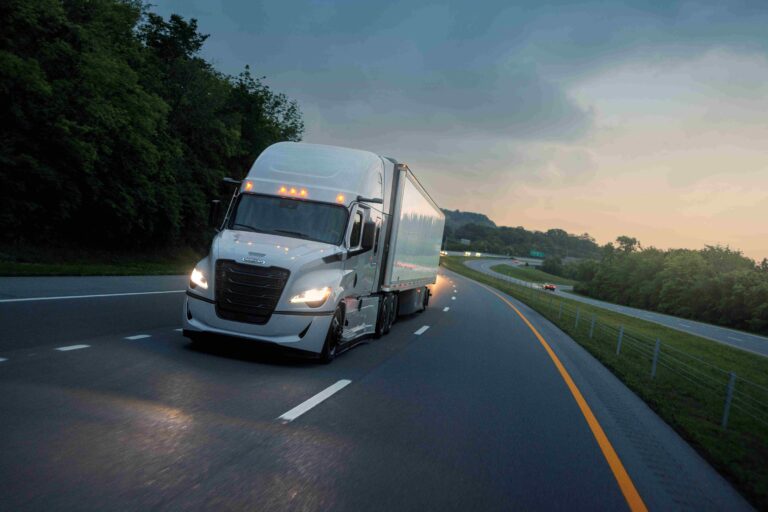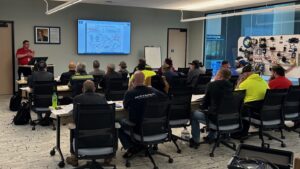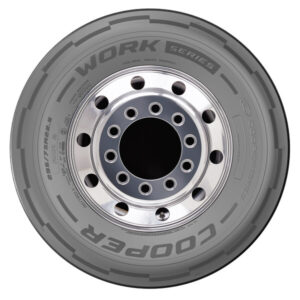PORTLAND, Ore. — Daimler Trucks North America has stopped all new orders for new internal combustion vehicles in Oregon in a Dec. 20, 2024 statement.
“Effective immediately, DTNA is pausing all orders for new internal combustion vehicles intended for registration in Oregon,” said Mary C. Aufdemberg Daimler’s general manager of product strategy and market development, in a message to Oregon truck dealers.
According to the Willamette Week, Daimler, through its Freightliner and Western Star brands, is the leading producer of large trucks in the U.S., accounting for 40% of all new Class 8 trucks (tractor-trailers) sold in 2023, according to the American Truck Dealers association.
The Oregon Journalism Project began to research the issue and the decision stems from a new rule imposed by the Oregon Department of Environmental Quality that went into effect on Jan. 1.
The DEQ’s Advanced Clean Truck rule states, “Out of every 100 new Class 8 heavy trucks a manufacturer sells in Oregon in 2025, seven must be electric. That percentage of electric trucks will increase every year, reaching 40% of all heavy trucks sold in 2032.”
The Advanced Clean Truck rule was adopted in Oregon to reduce tailpipe and greenhouse gas emissions through advanced clean technology. The rule requires manufacturers of medium- and heavy-duty vehicles (Class 2b – 8) to sell zero-emission trucks as an increasing percentage of its overall sales from vehicle model year 2025 through 2035.
“The purpose of this division is to establish an Oregon Low Emission and Zero Emission Vehicle program that implements California vehicle emission standards under section 177 of the federal Clean Air Act,” the Oregon DEQ said. “This program establishes criteria and procedures for the manufacture, distribution and sale of new motor vehicles and trucks in Oregon”
In November 2021, Oregon’s Environmental Quality Commission adopted the Clean Truck Rules, which includes Oregon’s Advanced Clean Trucks Rule, according to the DEQ website. This specific rule adopts by reference California’s Advanced Clean Trucks Regulation designed to support the transition of medium- and heavy-duty vehicles to zero-emission engines over time.
“The ACT Rule requires medium- and heavy-duty vehicle manufacturers to sell an increasing number of zero emission vehicles, beginning with the 2025 model year,” the DEQ said. “The rule sets specific sales targets that grow each year, making a shift from producing gas- and diesel-powered trucks to cleaner electric- or hydrogen-powered options. These target requirements apply to all new on-road vehicles with a gross vehicle weight rating greater than 8,500 lbs.”
While emergency vehicles, transit buses, charter buses, articulated shuttles and double-decker buses are exempt from the ACT rule, rule applies to any manufacturers offering new medium- and heavy-duty vehicles for sale in Oregon. However, if a manufacturer sells an average of fewer than 500 medium- and heavy-duty vehicles in a model year, then it is exempt from the ACT Rule requirements, according to the DEQ.
A DEQ fact sheet noted the ACT rule includes a number of flexibilities for manufacturers to determine which vehicle models to move to zero emissions. There is no ban on producing combustion-powered vehicle types. Manufacturers can continue to produce and sell gasoline- or diesel-powered trucks, like motor homes or tow trucks, while focusing on electrifying other vehicles, such as zero-emission school buses.
The DEG denied that the ACT rule would be so restrictive that their would be no diesel powered vehicles available for purchase in Oregon.
“The ACT rule was designed to ensure a smooth adoption of ZEVs while still ensuring that diesel-powered vehicles are available for purchase,” the DEQ said. “The rule is flexible and was recently changed to accommodate manufacturers’ requests for more flexibility. For example, manufacturers can purchase credits from other manufacturers selling ZEVs or produce and sell near-ZEVs (e.g. plug-in hybrid electric trucks). In 2025, only 7- 11% of vehicle sales must be zero-emission, as shown in the above chart.”
The DEQ also noted that vehicle owners and fleets do not have any specific purchasing requirements. The ACT rule only applies to businesses or manufacturers that sell new medium- and heavy-duty vehicles in Oregon.
According to the Willamette Week, Daimler said its decision was base on “ambiguity” in how Oregon accounts for electric truck sales. The company fears it might fail to meet Oregon’s quota, triggering penalties saying it is an unacceptable risk.
DEQ spokeswoman Susan Mills said her agency immediately contacted Daimler after the Dec. 20 announcement.
Mills says DEQ sought to resolve what she terms an “inaccurate” communication from the agency about when manufacturers would get credit for an electric truck sale, according to the Willamette Week.







